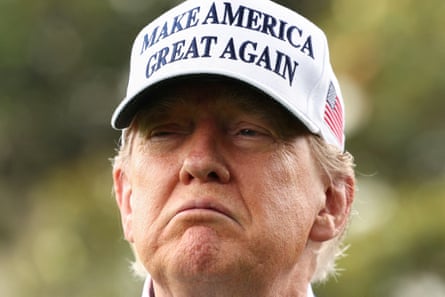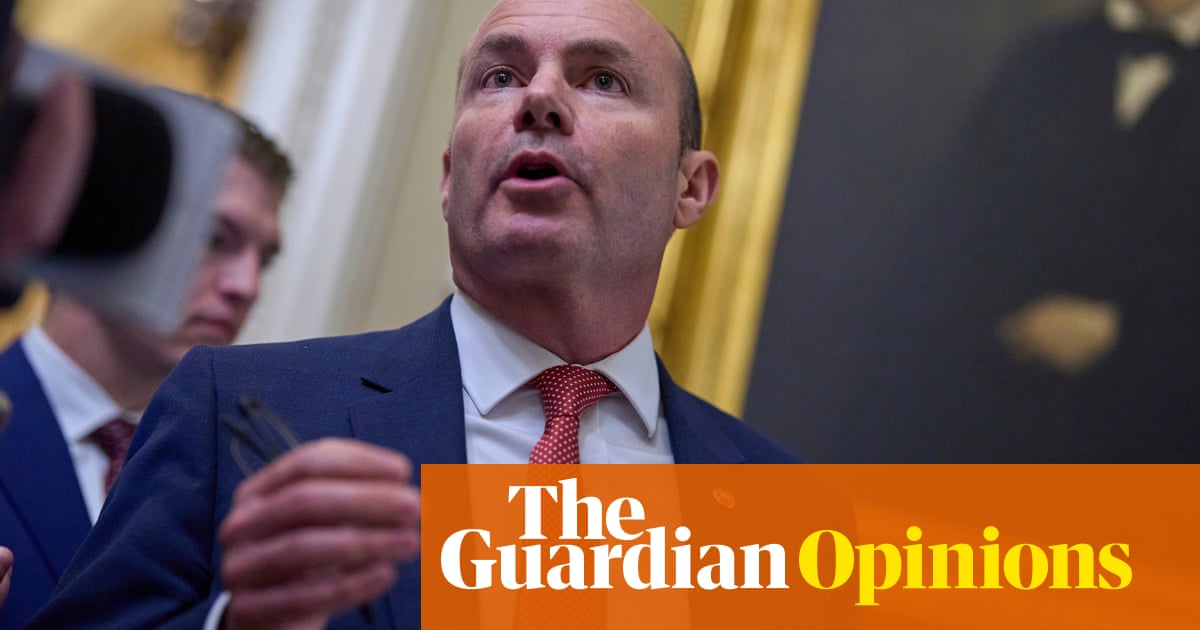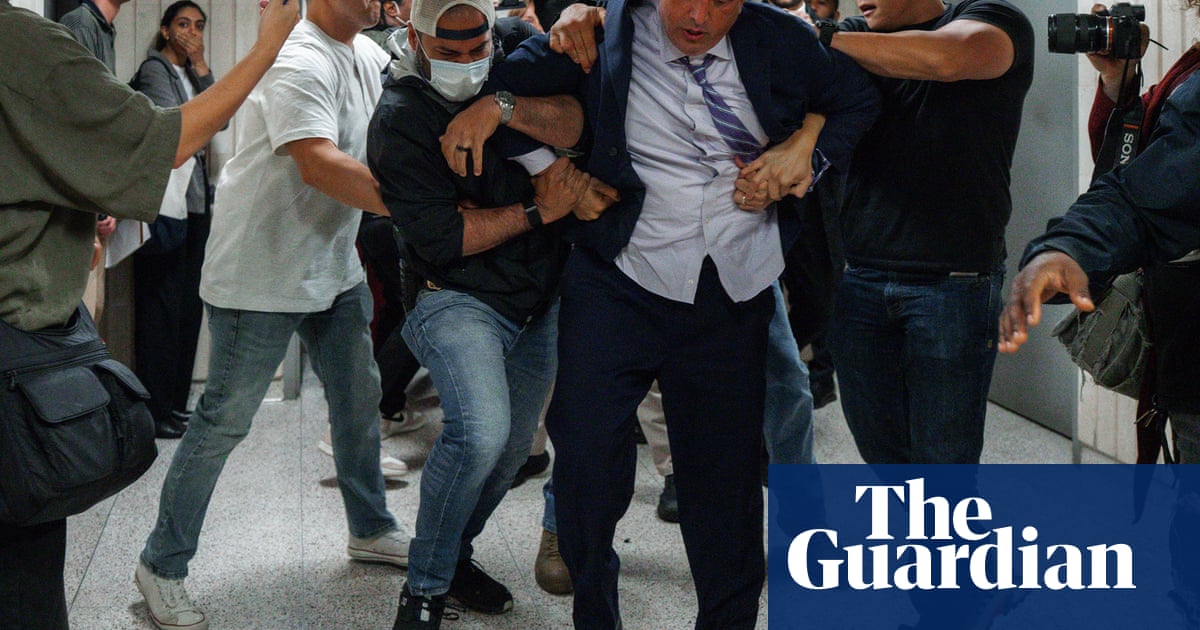It reads like a checklist of milestones on the road to autocracy.
A succession of opposition politicians, including Alex Padilla, a US senator, are handcuffed and arrested by heavy-handed law enforcement for little more than questioning authority or voicing dissent.
A judge is arrested in her own courthouse and charged with helping a defendant evade arrest.
Masked snatch squads arrest and spirit people away in public in what seem to be consciously intimidating scenes.
The president deploys the military on a dubious legal premise to confront protesters contesting his mass roundups of undocumented migrants.
A senior presidential aide announces that habeas corpus – a vital legal defence for detainees – could be suspended.
The sobering catalogue reflects the actions not of an entrenched dictatorship, but of Donald Trump’s administration as the president’s sternest critics struggle to process what they say has been a much swifter descent into authoritarianism than they imagined even a few weeks ago.
“Trump is throwing authoritarian punches at a much greater rate than any of these other cases in their first year in power,” said Steven Levitsky, Harvard political scientist and author, with Daniel Ziblatt, of How Democracies Die. “But we don’t yet know how many of those punches will land or how society will respond.”
Five months after Trump’s inauguration, seasoned analysts with years of studying one-time stable democracies degenerating into autocracies are voicing alarm at the speed of the Trump administration’s authoritarian assault on institutions and constitutionally guaranteed freedoms of expression. They are unnerved by the deployment of masked Immigration, Customs and Enforcement (Ice) agents – dressed in plain clothes and without identifying official insignia – to arrest people on the streets for deportation, a tactic critics say is evocative of dictatorships and designed to provoke fear among the general population.
Some voice doubts about the judiciary’s capacity to act as a democratic safeguard, despite a wave of legal challenges to the president’s executive orders. They cite the 6-3 conservative majority of the US supreme court, which has a history of issuing rulings friendly to the president, who appointed three of its justices to the bench during his first administration.
Trump has tried to propel the US in an authoritarian direction with greater intensity than noted autocrats like the late Hugo Chávez of Venezuela, Recep Tayyip Erdoğan of Turkey, or Viktor Orbán, Hungary’s prime minister, according to Levitsky.
Eric Rubin, a former US ambassador to Bulgaria and acting ambassador to Moscow, said Trump was outpacing Vladimir Putin, the Russia president for whom he had often voiced admiration.
“This is going faster than Putin even came close to going in terms of gradually eliminating democratic institutions and democratic freedoms,” said Rubin, who witnessed Putin’s early years in power at close quarters. “It took him years. We’re not even looking at six months here.”
Bright Line Watch, a survey of political scientists, recently gave the US a score of 53 – the lowest since it started collecting data in 2017 – on a spectrum ranging from 0 for total dictatorship to 100, denoting a perfect democracy, according to Brendan Nyhan, a professor at Dartmouth College, one of the institutions conducting the study.
Academics commissioned said they expected the country to fall further, forecasting a score of 48 by 2027.
“We’re in the range of countries like Brazil and Israel, but well above countries like Russia,” said Nyhan. “I do expect things to get worse. The potential for further democratic erosion is very real.”
Key to whether Trump can tilt America decisively into authoritarianism will be his efforts to assert control over the armed forces, argued Levitsky.
“Trump’s ramping up of the effort to politicize the military can still go in multiple directions,” he said. “It could be really ugly and bad, because the only way that you can get from where we are to real authoritarianism like Nicaragua or Venezuela or Russia is if Trump has the military and security forces on his side, and he’s taken steps in that direction.”
Padilla’s manhandling – after he tried to question homeland security secretary Kristi Noem at a news conference – drew fierce scrutiny. It took place against a backdrop of Trump’s deployment of 4,000 national guard troops on to the streets of Los Angeles, later augmented by 700 active marines, against demonstrators protesting against the administration’s anti-migrant crackdown, who did not appear to be present an undue challenge to local law enforcement authorities.

The decisions took place against the opposition of California’s governor, Gavin Newsom, who would normally be empowered to deploy the national guard in the state but whose role Trump usurped as he sought to make an example of a state with a large immigrant population and whose Democratic stranglehold he wishes to break.
The deployments, denounced by opponents as an attempt to foment violent confrontation, took place in the run-up to a military parade staged in Washington last Saturday. Ostensibly held to honor the US army’s 250th anniversary, the event was held – perhaps not coincidentally – on the president’s 79th birthday. Opponents said it was redolent of autocracies like China, North Korea and Russia and reflected a desire by Trump to turn the military into his personal tool.
Amid speculation that the parade might be disrupted by an anti-Trump No Kings protest on the same day, the president threatened to use “very big force” against demonstrators, in apparent contradiction of the US’s tradition of tolerance of peaceful dissent. In the event, no clashes between government forces and protesters were reported at the Washington parade on a day when an estimated 5 million demonstrators turned out at 2,100 locations across the US, according to organizers. However, there were sporadic reports of violence elsewhere; in northern Virginia, a man drove his car through a crowd of No Kings protesters, striking one, in what police said was an intentional act.
But in a much worse portent for democracy on the same day, Melissa Hortman, a Democratic state legislator in Minnesota, was shot dead at her home along with her husband Mark in what was called a targeted political assassination allegedly carried out by 57-year-old Vance Boelter, whose friends say was a Christian nationalist Trump supporter.
Boelter, who is now in police custody, is suspected of then shooting and wounding another politician, John Hoffman – a Democratic member of the Minnesota senate – and his wife, Yvette. He is said to have had a list with more than 45 targets, all of them Democrats, at the time of his arrest.
Rubin said the shootings created a climate of fear comparable to that of Weimar Germany before the rise of Hitler.
“Fear is powerful and pernicious,” he said. “People won’t be willing to to be candidates for these positions because they’re afraid. The general public is intimidated. I’m somewhat intimidated.
“You can say passivity is immoral in the face of evil, that it is complicity, all the things that were said about Nazi Germany. Well, it’s easy to say that. In Nazi Germany, there were some courageous people, but not very many, because they were afraid.”
Equally significant, analysts say, is the Trump administration’s efforts to expand the legal boundaries of the president’s powers – the fate of which will be decided by the supreme court, which issued a ruling last year that effectively granted Trump vast prosecutorial immunity for acts committed in office.
“Has Trump solidified his power? Have we reached a point where we have an out-of-control president who controls all the institutions? No, but we’re at the 11th hour,” said Kim Lane Scheppele, a sociology and international affairs professor at Princeton University. “He’s moving at a truly alarming speed and pressing all the authoritarian buttons. We’re a few supreme court decisions away from having a president we can’t get rid of.”
Trump’s national guard deployments in Los Angeles may have been aimed at establishing a legal precedent enabling him to deploy troops at will when state authorities tried to defy him.
“He wants to establish that he can disable the governors from fighting back against him [by using] military force,” Scheppele said. “The Los Angeles deployment was perceived as an escalation but in reality, the military haven’t done that much. However, there’s a legal infrastructure underneath it all that’s scarier.”
Levitsky, said the administration – spearheaded by Stephen Miler, the powerful White House deputy chief of staff – had adopted a practice of declaring emergencies to acquire potentially dictatorial powers.
“In the US constitution, almost every existing constraint on executive power can be circumvented in a state of emergency,” he said. “And it’s becoming clear that the administration is learning that emergencies are the easiest route to circumvent the law and not be blocked by the courts. The supreme court is very reluctant to say, ‘No, that’s not an emergency, Trump, you lied. You made that up.’ It’s sort of a free pass for circumventing the rule of law.”
The White House used economic emergency legislation to impose sweeping trade tariffs, while invoking the 1798 Alien and Sedition Act, passed in anticipation of a war with France, to justify summarily deporting alleged Venezuelan gang members. Miller repeatedly called last week’s protests in Los Angeles an “insurrection”, implicitly justifying the invocation of the Insurrection Act, which enables a president to use military forces to quash a rebellion on US soil.
Writing in the Atlantic, David Frum, an anti-Trump conservative commentator, warned that the penchant for emergencies could be applied to next year’s congressional elections, when the Democrats hope to regain control of the House of Representatives, an outcome that could curtail his authoritarian power grab.
“Trump knows full well that the midterms are coming. He is worried,” Frum wrote.
“He might already be testing ways to protect himself that could end in subverting those elections’ integrity. So far, the results must be gratifying to him – and deeply ominous to anyone who hopes to preserve free and fair elections in the United States under this corrupt, authoritarian, and lawless presidency.”
Even if Trump were to suffer an election reverse, his ability to wreak further havoc will remain, Nyhan warned, simply because Senate Republicans are unlikely to vote in sufficient numbers to remove him from office in the event of him being impeached by a Democratic-controlled House.
“The Founding Fathers anticipated Trump precisely,” he said, referring to the constitutional provision to try and remove a president and other officials for “high crimes and misdemeanors”.
“It was just assumed that Congress will jealously guard its prerogatives and impeach and remove any president who exceeded the boundaries of the constitution. But in our current political system, that is a seemingly impossible task.
“So we face the prospect of a lawless authoritarian continuing to act for the next three and a half years, and there’s a great deal of damage he can do in that time.”

 German (DE)
German (DE)  English (US)
English (US)  Spanish (ES)
Spanish (ES)  French (FR)
French (FR)  Hindi (IN)
Hindi (IN)  Italian (IT)
Italian (IT)  Russian (RU)
Russian (RU)  6 hours ago
6 hours ago
























Comments